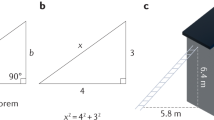Abstract
Following presentation of a slide-tape instructional program, the performance of subjects in two learning strategy groups-networking and rote-was compared to a control group on a concept learning task and a spatial learning task. Networking proved more effective than rote learning and the control group on both tasks; networking also allowed for improved retention over time (in this case, one week). This article reviews some of the research on learning strategies and suggests how the network strategy can enhance learning in academic situations.
Similar content being viewed by others
References
Anderson, R. C, & Hidde, J. L. Imagery and sentence learning.Journal of Educational Psychology, 1971,62, 526–532.
Bartlett, F. C.Remembering: A study in experimental and social psychology. London: Cambridge University Press, 1932.
Bower, G. H. A selective review of organizational factors in memory. In E. Tulving & W. Donaldson (Eds.),Memory and organization. New York: Academic Press, 1972.
Bower, G. H., Clark, M. C, Lesgold, A., & Winzenz, D. Hierarchical retrieval schemes in recall of categorized word lists.Journal of Verbal Learning and Verbal Behavior, 1969,8, 323–343.
Canelos, J. The instructional effectiveness of three content-independent learning strategies on different learning outcomes when learners received visualized instruction of varying complexity.Journal of Experimental Education, in press.
Collins, A. M., & Quillian, M. R. Retrieval time from semantic memory.Journal of Verbal Learning and Verbal Behavior, 1969,8, 240–247.
Dansereau, D. The development of a learning strategies curriculum. In H. F. O’Neil, Jr. (Ed.),Learning strategies. New York: Academic Press, 1978.
Dansereau, D., Actkinson, T. R., & Long, G. L.Learning strategies: A review and synthesis of the current literature, 1974. (ERIC Document Reproduction Service No. ED 103 403).
Dansereau, D., Long, G. L., McDonald, B. A., Actkinson, T. R., Ellis, A. M., Collins, K., Williams, S., & Evans, S. H.Effective learning strategy training program: Development and assessment (AFHRL-TR-75-41, Contract F41609-74-C-0013). Lowry Colorado AFB, 1975.
Dwyer, F. M., Jr.A study of the relative effectiveness of varied visual illustrations, (U.S. Dept. of Health, Education and Welfare, Office of Education, Bureau of Research, Project 6-8840, Grant OEG 107 068840 0290, 1967.
Dwyer, F. M., Jr.Strategies for improving visual learning. State College, Pa.: Learning Services, 1978.
Gagne, R. M.The conditions of learning. New York: Holt, Rinehart, & Winston, 1977.
Gagne, R. M., & Briggs, L. J.Principles of instructional design. New York: Holt, Rinehart, & Winston, 1974.
Hilgard, E. R., & Bower, G. H.Theories of learning. Englewood Cliffs, New Jersey: Prentice-Hall Co., 1975.
O’Neil, H. F., Jr.Learning strategies. New York: Academic Press, 1978.
O’Neil, H. F., Jr., & Spielberger, C. D.,Cognitive and affective learning strategies. New York: Academic Press, 1979.
Osier, S. F., & Fivel, M. W. Concept attainment: I. The role of age and intelligence in concept attainment by induction.Journal of Experimental Psychology, 1961,62, 1–8.
Paivio, A. Mental imagery in associative learning and memory.Psychological Review, 1969,76, 241–263.
Persensky, J. J., & Senter, R. J. An investigation of “bizarre” imagery as a mnemonic device.The Psychological Record, 1970,20, 145–150.
Rasco, R. W., Tennyson, R. D., & Boutwell, R. C. Imagery instructions and drawing in learning prose.Journal of Educational Psychology, 1975,67, 188–192.
Rigney, J. W. Learning strategies: A theoretical perspective. In H. F. O’Neil, Jr. (Ed.),Learning strategies. New York: Academic Press, 1978.
Weinstein, C. E., Elaboration skills as a learning strategy. In H. F. O’Neil, Jr. (Ed.),Learning strategies. New York: Academic Press, 1978.
Author information
Authors and Affiliations
Rights and permissions
About this article
Cite this article
Canelos, J., Taylor, W. & Altschuld, J. Networking vs. rote learning strategies in concept acquisition. ECTJ 30, 141–149 (1982). https://doi.org/10.1007/BF02766593
Issue Date:
DOI: https://doi.org/10.1007/BF02766593




